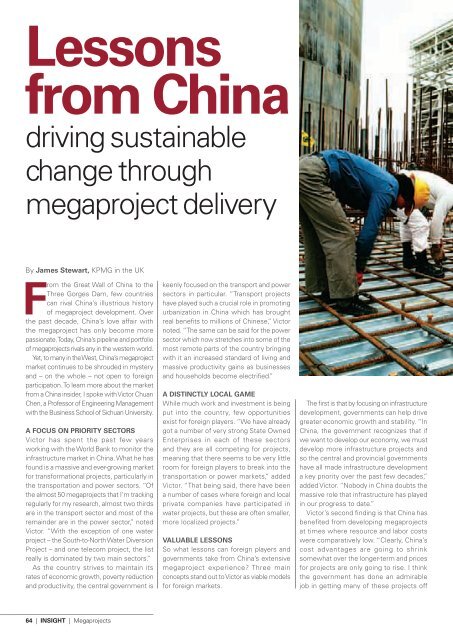Megaprojects - KPMG
Megaprojects - KPMG
Megaprojects - KPMG
Create successful ePaper yourself
Turn your PDF publications into a flip-book with our unique Google optimized e-Paper software.
Lessons<br />
from China<br />
driving sustainable<br />
change through<br />
megaproject delivery<br />
By James Stewart, <strong>KPMG</strong> in the UK<br />
From the Great Wall of China to the<br />
Three Gorges Dam, few countries<br />
can rival China’s illustrious history<br />
of megaproject development. Over<br />
the past decade, China’s love affair with<br />
the megaproject has only become more<br />
passionate. Today, China’s pipeline and portfolio<br />
of megaprojects rivals any in the western world.<br />
Yet, to many in the West, China’s megaproject<br />
market continues to be shrouded in mystery<br />
and – on the whole – not open to foreign<br />
participation. To learn more about the market<br />
from a China insider, I spoke with Victor Chuan<br />
Chen, a Professor of Engineering Management<br />
with the Business School of Sichuan University.<br />
A focus on priority sectors<br />
Victor has spent the past few years<br />
working with the World Bank to monitor the<br />
infrastructure market in China. What he has<br />
found is a massive and ever-growing market<br />
for transformational projects, particularly in<br />
the transportation and power sectors. “Of<br />
the almost 50 megaprojects that I’m tracking<br />
regularly for my research, almost two thirds<br />
are in the transport sector and most of the<br />
remainder are in the power sector,” noted<br />
Victor. “With the exception of one water<br />
project – the South-to-North Water Diversion<br />
Project – and one telecom project, the list<br />
really is dominated by two main sectors.”<br />
As the country strives to maintain its<br />
rates of economic growth, poverty reduction<br />
and productivity, the central government is<br />
keenly focused on the transport and power<br />
sectors in particular. “Transport projects<br />
have played such a crucial role in promoting<br />
urbanization in China which has brought<br />
real benefits to millions of Chinese,” Victor<br />
noted. “The same can be said for the power<br />
sector which now stretches into some of the<br />
most remote parts of the country bringing<br />
with it an increased standard of living and<br />
massive productivity gains as businesses<br />
and households become electrified.”<br />
A distinctly local game<br />
While much work and investment is being<br />
put into the country, few opportunities<br />
exist for foreign players. “We have already<br />
got a number of very strong State Owned<br />
Enterprises in each of these sectors<br />
and they are all competing for projects,<br />
meaning that there seems to be very little<br />
room for foreign players to break into the<br />
transportation or power markets,” added<br />
Victor. “That being said, there have been<br />
a number of cases where foreign and local<br />
private companies have participated in<br />
water projects, but these are often smaller,<br />
more localized projects.”<br />
vALuable lessons<br />
So what lessons can foreign players and<br />
governments take from China’s extensive<br />
megaproject experience Three main<br />
concepts stand out to Victor as viable models<br />
for foreign markets.<br />
The first is that by focusing on infrastructure<br />
development, governments can help drive<br />
greater economic growth and stability. “In<br />
China, the government recognizes that if<br />
we want to develop our economy, we must<br />
develop more infrastructure projects and<br />
so the central and provincial governments<br />
have all made infrastructure development<br />
a key priority over the past few decades,”<br />
added Victor. “Nobody in China doubts the<br />
massive role that infrastructure has played<br />
in our progress to date.”<br />
Victor’s second finding is that China has<br />
benefited from developing megaprojects<br />
at times where resource and labor costs<br />
were comparatively low. “Clearly, China’s<br />
cost advantages are going to shrink<br />
somewhat over the longer-term and prices<br />
for projects are only going to rise. I think<br />
the government has done an admirable<br />
job in getting many of these projects off<br />
64 | INSIGHT | <strong>Megaprojects</strong>





![[2012] UKUT 399 (TCC)](https://img.yumpu.com/51352289/1/184x260/2012-ukut-399-tcc.jpg?quality=85)





![Neutral Citation Number: [2009] EWHC 3198 (Ch) Case No: CH ...](https://img.yumpu.com/50120201/1/184x260/neutral-citation-number-2009-ewhc-3198-ch-case-no-ch-.jpg?quality=85)





